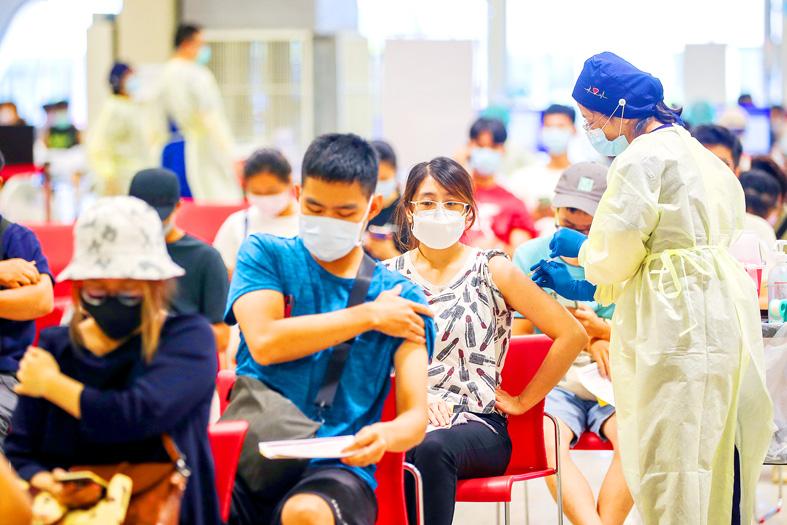Taiwan should abandon its “COVID zero” strategy and instead focus on COVID-19 vaccines and improving clinical outcomes, a Taiwanese medical expert said yesterday, citing Singapore’s experience in battling the pandemic.
Huang Yun-ru (黃韻如), a professor of medicine at National Taiwan University who lives in Singapore, made the remarks in an online news conference organized by the National Taiwan University Hospital.
As vaccines are effective in preventing deaths, severe symptoms and hospitalizations, it is possible to live with COVID-19 if a large percentage of the population is fully vaccinated, she said.

Photo: CNA
Singapore has vaccinated 80 percent of its people against COVID-19, the highest vaccination rate in the world, Huang said, adding that Taiwan’s top priority should be raising its inoculation rate.
An indefinite border closure cannot be sustained in Singapore, which depends on imports for 90 percent of its food, and needs Changi Airport to stay open so that the city-state can remain a regional hub, she said.
Singapore attained such a high vaccination rate because its government created a precisely calculated vaccine acquisition program in April last year and began distributing vaccines in December, Huang said.
Although people older than 70 were given top priority for COVID-19 vaccination, the age group had the lowest inoculation rate in the city-state, she said, adding for example that 90 percent of Singaporean youths were fully vaccinated, despite their lower priority.
Singapore launched a campaign to persuade elderly vaccine holdouts following the outbreak of the Delta variant of SARS-CoV-2, which caused deaths and hospitalizations overwhelmingly in that demographic, Huang said.
The measures included sending medical volunteers to communities to inoculate people and carry out public awareness campaigns, which appeared to have increased vaccination rates among elderly people over the past two months, she said.
The city-state uses the Pfizer-BioNTech and Moderna COVID-19 vaccines for its publicly subsidized vaccination program, but other vaccines are available for self-paid vaccination for people who do not trust messenger RNA-based vaccines, she said.
Last month, Singapore unveiled an App-based vaccine passport for visiting public places, Huang said.
Taiwan has not adopted similar measures due to its low vaccination rate and legal concerns over digital privacy, she said.
Digital vaccine passports do not necessarily infringe of human rights and Singapore has shown that they are a useful incentive for people to get vaccinated, she added.

Taiwanese can file complaints with the Tourism Administration to report travel agencies if their activities caused termination of a person’s citizenship, Mainland Affairs Council Minister Chiu Chui-cheng (邱垂正) said yesterday, after a podcaster highlighted a case in which a person’s citizenship was canceled for receiving a single-use Chinese passport to enter Russia. The council is aware of incidents in which people who signed up through Chinese travel agencies for tours of Russia were told they could obtain Russian visas and fast-track border clearance, Chiu told reporters on the sidelines of an event in Taipei. However, the travel agencies actually applied

Japanese footwear brand Onitsuka Tiger today issued a public apology and said it has suspended an employee amid allegations that the staff member discriminated against a Vietnamese customer at its Taipei 101 store. Posting on the social media platform Threads yesterday, a user said that an employee at the store said that “those shoes are very expensive” when her friend, who is a migrant worker from Vietnam, asked for assistance. The employee then ignored her until she asked again, to which she replied: "We don't have a size 37." The post had amassed nearly 26,000 likes and 916 comments as of this

US President Donald Trump said "it’s up to" Chinese President Xi Jinping (習近平) what China does on Taiwan, but that he would be "very unhappy" with a change in the "status quo," the New York Times said in an interview published yesterday. Xi "considers it to be a part of China, and that’s up to him what he’s going to be doing," Trump told the newspaper on Wednesday. "But I’ve expressed to him that I would be very unhappy if he did that, and I don’t think he’ll do that," he added. "I hope he doesn’t do that." Trump made the comments in

Tourism in Kenting fell to a historic low for the second consecutive year last year, impacting hotels and other local businesses that rely on a steady stream of domestic tourists, the latest data showed. A total of 2.139 million tourists visited Kenting last year, down slightly from 2.14 million in 2024, the data showed. The number of tourists who visited the national park on the Hengchun Peninsula peaked in 2015 at 8.37 million people. That number has been below 2.2 million for two years, although there was a spike in October last year due to multiple long weekends. The occupancy rate for hotels